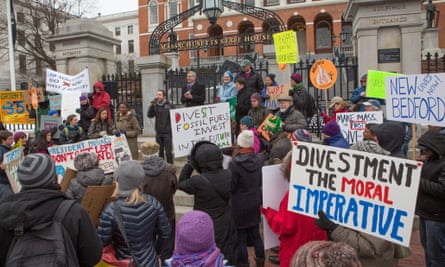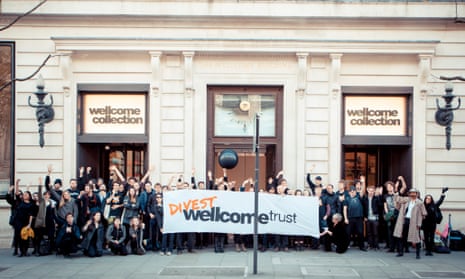“Here’s my bet: the kids are going to win and when they do, it’s going to matter,” wagered the environmentalist Bill McKibben to Rolling Stone two years ago. He was on tour with a new campaign that was rapidly gaining traction on college campuses across the United States. Students were persuading their universities to withdraw their money from fossil fuels – the richest companies in the world.
Since McKibben’s climate movement 350.org launched its fossil fuel divestment campaign in 2012, more than 220 institutions – including universities, faith organisations, local authorities, pension funds and foundations – have committed to divesting from fossil fuels.

Syracuse University is the largest so far. It committed in April 2015 to divest its $1.18bn (£800m) endowment and to seek new investments in clean energy technologies. The decision came a year after Stanford University committed to move out of coal investments.
In 2013 the Fossil Free campaign was launched in the UK. It highlighted the £5bn held in universities’ endowments, with the first campaigns launching at Edinburgh, Birmingham and University College London. Yet it was the Quakers in Britain who became the first to divest in October that year.
By the end of the year, research by Oxford University suggested that it had become the fastest growing divestment campaign in history, surpassing those targeting the tobacco industry and apatheid in South Africa. The movement has only continued to accelerate.
The most symbolic announcement of all came in September 2014 as the heirs to Rockefeller oil fortune came on board, withdrawing the fossil fuel investments in the $860m Rockefeller Brothers Fund.
“We are quite convinced that if he [John D Rockefeller] were alive today, as an astute businessman looking out to the future, he would be moving out of fossil fuels and investing in clean, renewable energy,” said president Stephen Heintz. He made the statement as the fund joined with 800 global investors pledging to divest from fossil fuels ahead of a UN summit on climate change.

In March 2015, the UN organisation responsible for coordinating a global climate change deal backed divestment saying it did so because “it sends a signal to companies, especially coal companies, that the age of ‘burn what you like, when you like’ cannot continue.”
Moral victories were hailed as the World Council of Churches – which represents half a billion Christians – ruled out all fossil fuel investments in 2014 and the Church of England moved its £9bn fund out of thermal coal and tar sands in April.
“The church has a moral responsibility to speak and act on both environmental stewardship and justice for the world’s poor,” said Rev Canon Prof Richard Burridge, deputy chair of the CoE’s ethical investment advisory group that undertook the review.
In April, the Guardian’s parent company, Guardian Media Group said it would divest its £800m fund, becoming the largest to date to have made the commitment. Divesting from fossil fuels was “a hard-nosed business decision, influenced by the values of our organisation”, said GMG’s chair, Neil Berkett.The move followed a campaign launched by the Guardian calling on the world’s largest charitable foundations and funders of medical research – the Wellcome Trust and the Bill and Melinda Gates Foundation – to divest. High profile supporters include actor Tilda Swinton, chef Yotam Ottolenghi and activist Bianca Jagger.
Meanwhile, the movement continues to grow on UK campuses. Last October Glasgow university became the first in Europe to commit to fossil fuel divestment. The university of Bedfordshire and Soas, University of London have since joined them. Oxford University, the second biggest by endowment in the country, has ruled out direct investments in coal and tar sands.
As the campaign has grown, it has become more global, with institutions divesting from Sweden to New Zealand to the Marshall islands in the Pacific. It has provoked reactions from those in power, with Australian prime minister lambasting the Australian National University’s divestment as a “stupid decision” last year.
The campaign was given a boost in April 2013 by the launch of a report by economist Nick Stern and thinktank Carbon Tracker which showed that overvaluation of fossil fuel reserves could be creating an investment bubble with the potential to plunge the world into deep financial crisis. It is estimated that if international agreements to avoid dangerous levels of climate change are heeded, two-thirds of fossil fuel reserves in the ground cannot be burned.
“Back in 2012, when we started fanning the divestment flames we had no idea what a wildfire would quickly spread around the world,” says Jamie Henn of 350.org. “People instantly understood the power of challenging institutions to put their money where their mouths are.”
Timeline of the divestment movement:
April 2013 San Francisco and Seattle divest from fossil fuels
October 2013 Quakers in Britain divest
February 2014 New School, New York divests from fossil fuels
May 2014 Stanford university divests from coal
June 2014 British Medical Association divests
July 2014 World Council of Churches rules out fossil fuel investments
September 2014 Rockefeller Brothers Fund divests from fossil fuels
September 2014 Oxford City council divests from fossil fuels
October 2014 Glasgow University divests from fossil fuels
October 2014 Australian National University divests from fossil fuels
November 2014 Victoria University, New Zealand divests from fossil fuels
February 2015 New School, New York divests from fossil fuels
April 2015 Syracuse University divests from fossil fuels
April 2015 Guardian Media Group divests from fossil fuels
April 2015 Soas, University of London divests from fossil fuels
April 2015 Church of England divests from thermal coal and tar sands
May 2015 London School of Hygiene and Tropical Medicine divests from coal
May 2015 Oxford University rules out investing in coal and tar sands

Comments (…)
Sign in or create your Guardian account to join the discussion